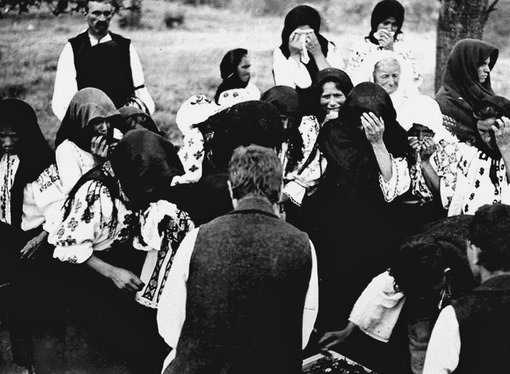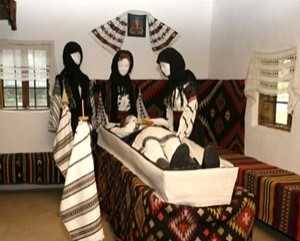Among the important events in human life, along with birth and marriage, there is also death. Therefore, in the Romanian tradition there are many customs and rituals that mark the passing away of a person, which may differ depending on the area. We will tell here a little about vigils (warding the dead between the moment of death and the actual funeral) and the custom of mourners, an old and disturbing custom of the Romanian people.
When a man dies, the church bells are rung to announce the community, and in some areas, a black flag is placed at the gate of the house where this sadness came. The dead is buried with the best clothes – there is this custom: people carefully prepare their funeral clothes in advance, the best and most beautiful clothes they have, never worn before. So beautifully arranged, the dead person is laid on a table in the house, with a lighted candle at his head, the mirrors in the room are turned to face the walls – it is said that if he is reflected in the mirror, the dead person turns into an undead – and the coffin is open, traditionally, for 3 days, until the burial.
During these 3 days, the vigil takes place: family, friends and acquaintances gather in the house of the deceased to watch over him, the room not being able to remain empty. Traditionally, no one is invited to the vigil, but people come there alone to say goodbye. Many times, at the vigil, people eat and drink, remember of the deceased, and even tell funny stories and laugh. In some areas of the country, the vigil can even be a joyful moment, with music and dance, considering that it is the last time spent with this dear person.
At the end of these 3 days, the funeral takes place. In the old days, a very disturbing and impressive custom was that of mourners, which, unfortunately, today has almost completely disappeared. Mourners are women who mourn over the head of the dead, crying and calling out to him, in an almost theatrical way. The mourners, women from the village, in some areas also had a specific ritual: they met before the funeral to compose the verses they were going to shout, these being different depending on the age, gender or circumstances of the deceased, or the place they are shouted (at home, on the road or at the cemetery). The lyrics could vary from curses to death, to blessings for the family left behind – different from village to village and from person to person.
The significance of this tradition lies in the belief that the mourning of the deceased will bring him a better life in the next world, and his soul will ascend more smoothly to heaven if it is mourned by more people. But this shocking custom was also a way to voice the pain of those close to them, uniting people in this suffering.


